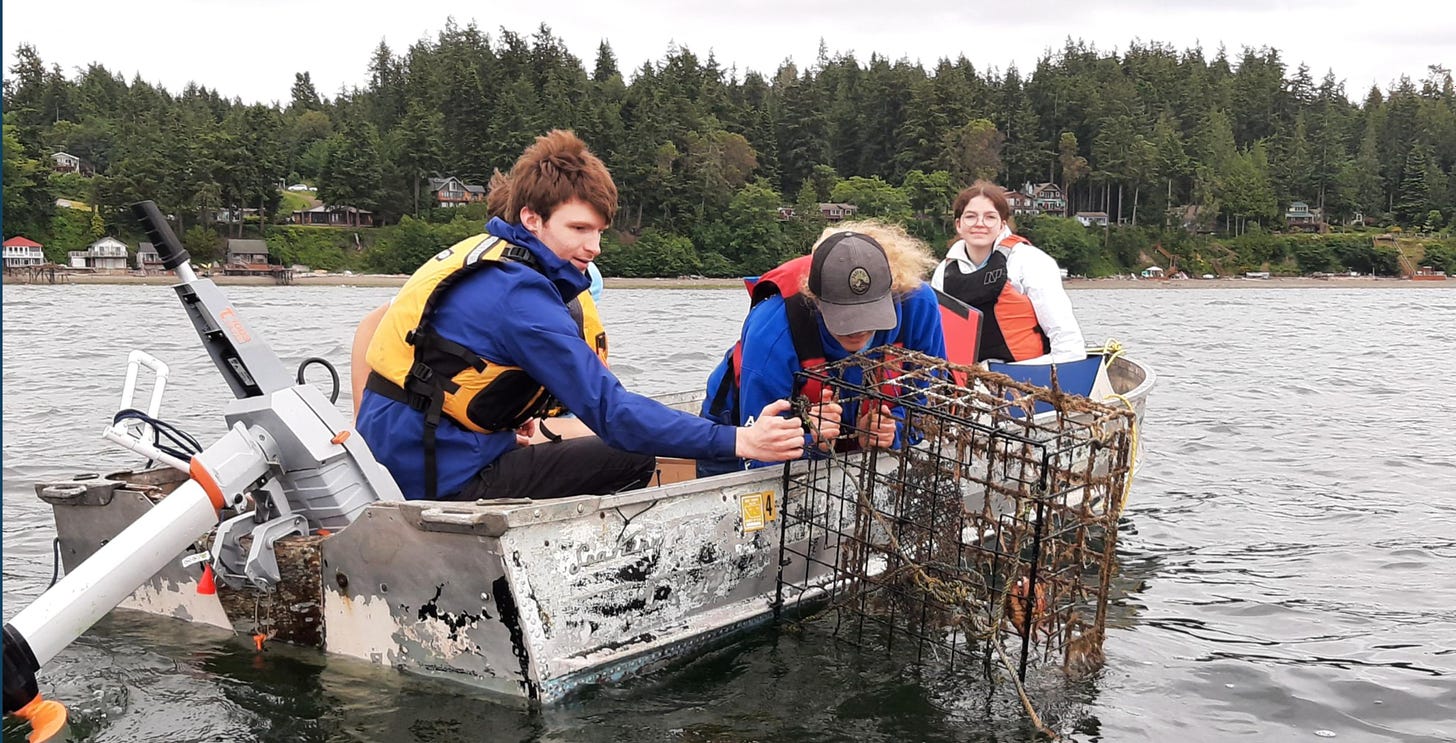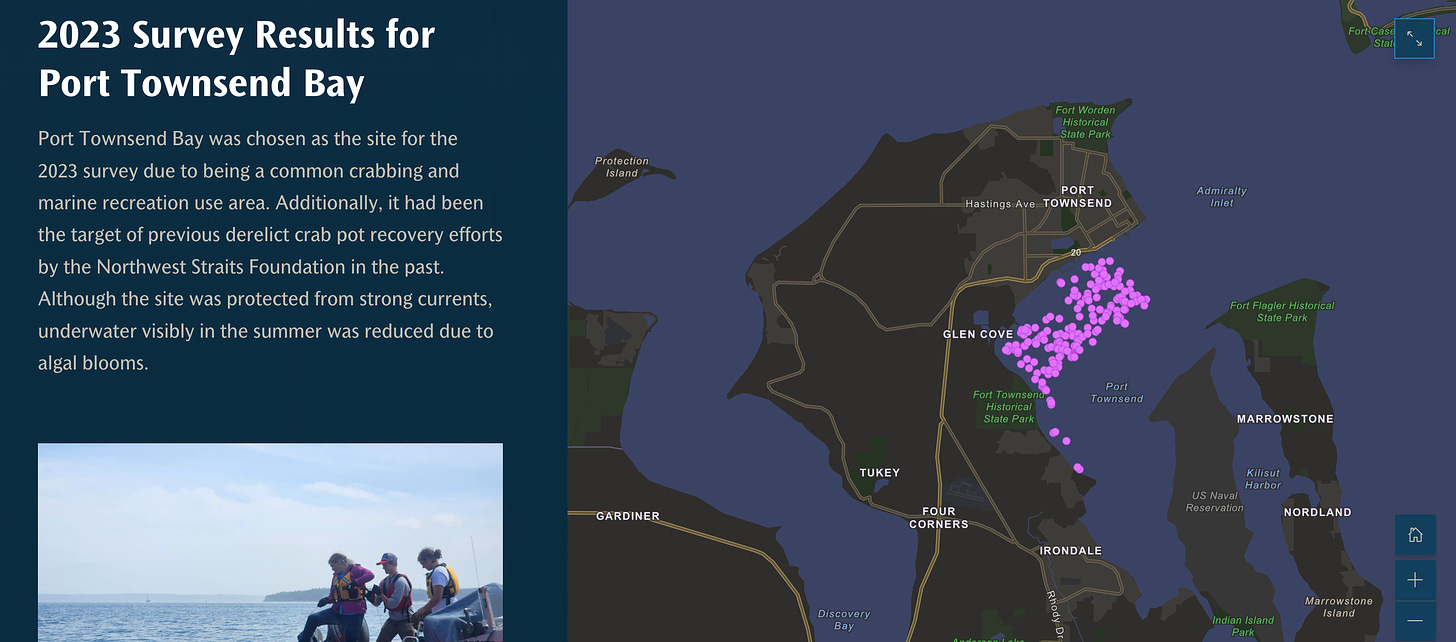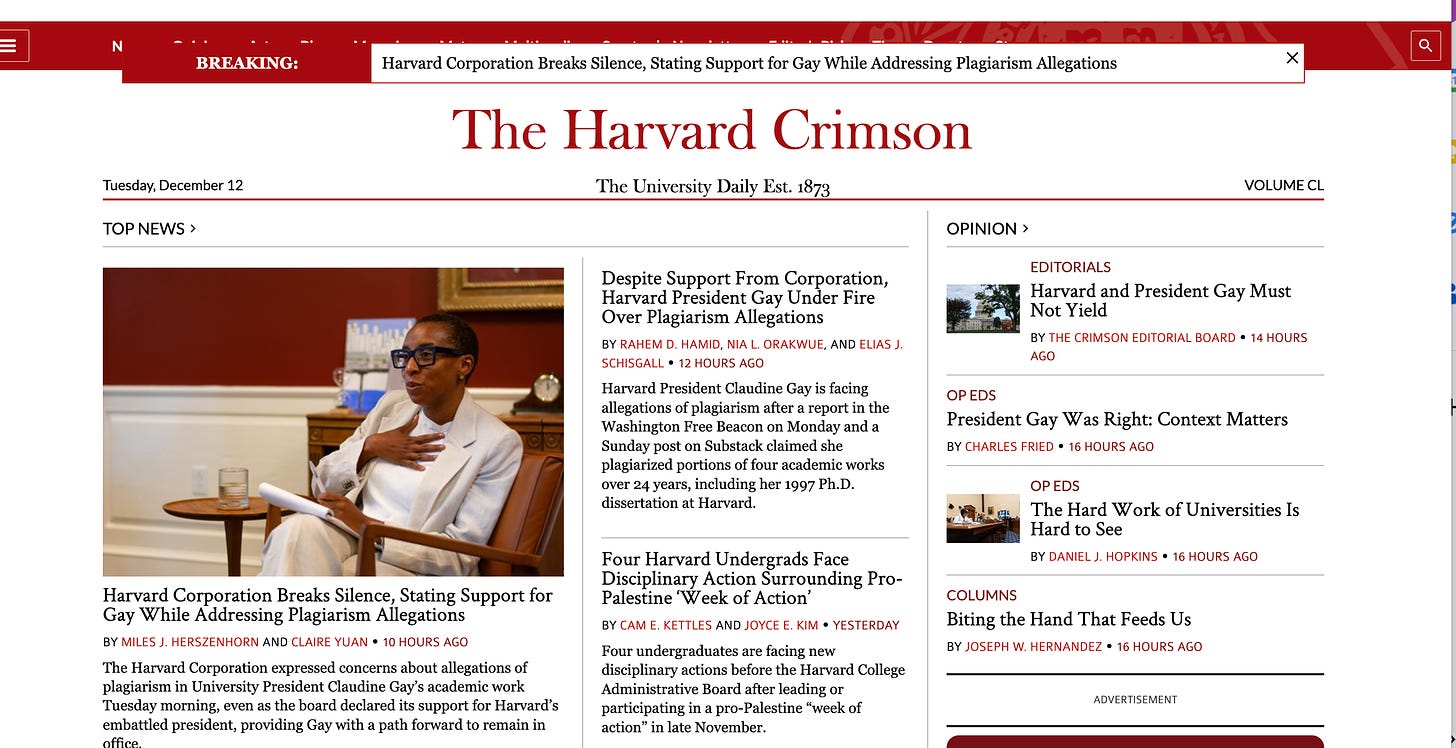‘The Kids Are All Right...’
To be more precise: Here are young people who are doing the right things. Different regions, different backgrounds, different goals. Similar pluck.
Members of the ‘Sea Dragons,’ retrieving abandoned crab pots that are causing wildlife loss in the Salish Sea of the Pacific northwest. (Sea Dragons story map.)
Everyone knows what’s wrong with universities, what’s wrong with Kids These Days, what’s hopeless about everything else.
Here are two brief entries from two very different realms, connected mainly by my happening to know about each of them and thinking they deserve wider notice.
1) The Sea Dragons, saving the crabs.
The Salish Sea includes the waters surrounding Seattle in Washington state, and Vancouver and Victoria in British Columbia. The Sea Dragons is a small student-run group based in Port Townsend, Washington, whose members specialize in robotics.
This week the Sea Dragons and various partners were named among winners of an international “StoryMap” competition sponsored by Esri, the prominent digital mapping company that was founded by hometown friends of mine and is still based in the small town of Redlands, California. For more about StoryMaps and their possibilities, please see this StoryMap site. For more about this year’s competition—and the judges, who included my wife, Deb—please see this announcement.
What did the Sea Dragons do that is so remarkable?
The problem they wanted to address was the 12,000 crab pots estimated to be lost or abandoned every year in the Salish waters, and the 180,000 adult crabs that are estimated to die needlessly in these derelict traps.
The tools they wanted to use were advanced robotics that would help them find, identify, and retrieve these pots, before any more wildlife was drawn into them.
The explanatory medium they chose was the StoryMap, which allowed them to combine photos, videos, digital maps, historical charts and data, and text narratives to explain what they were up to.
Here’s a sample video from their StoryMap, showing a test run of the robots they have trained to retrieve abandoned crab pots.
And here is a real-world video of the team discovering an abandoned pot that contained more than 20 still-living crabs.
“The most exciting, rewarding, and sobering moment for the team was probably when we retrieved a trap absolutely teeming with crabs,” Logan Flanagan, an engineer, says in this StoryMap. “This was the reason we started the project, but seeing how much damage one derelict crab pot could cause left a lasting impression.”
Here is a screenshot of an interactive map, showing where their sonar sensors detected the abandoned pots:
You can see the whole interactive Sea Dragons StoryMap here, and read an Our Towns foundation post about it and other winners here.
Congratulations to the young Sea Dragons and all who supported them in this work.
2) The Crimson, breaking the news.
This has been a terrible few weeks for Harvard, the nation’s oldest and generally highest-prestige university. Name your media outlet, and some news story or opinion column has recently used “Harvard” as shorthand for “twilight of the elites.”
But here is something for the university to be proud of. Or, to be more precise, here is something I personally am proud of: Much of the news of what is going wrong (or right) at this university has been broken not by any of the world’s mainline print or broadcast outlets. Instead it has come from the undergraduates who, with zero “adult supervision” and no official connection whatsoever with the university, put out the student newspaper, The Harvard Crimson.
Of course I am biased, as I noted last year, in having long ago been the editor of this paper during another tumultuous time in the university’s history and the world’s. But I think anyone who follows journalism would have to notice—and admire—what today’s students are putting out.
Here is the online front page of the Crimson this afternoon:
Things I noted:
The “above the banner” news that “the corporation,” Harvard’s mafia-sounding ultimate governing board, was standing behind its embattled president, Claudine Gay. Crimson reporters—again, with no official university connections—broke that news at 5am today, before any of the “real” grown-up news services found out about it.
The news analysis on the left of the page, giving more details about “the corporation’s” move.
The breaking news stories in the center. One is a Crimson line-by-line analysis of allegations that Claudine Gay had plagiarized, or been sloppy with citations, in her academic work. The reporters, Rahem D. Hamid, Nia L. Orakwue, and Elias J. Schisgall, got original quotes from some of the scholars whose papers Gay was accused of having copied. (Those scholars generally pooh-poohed the controversy.) The reporters also fact-checked some of the tendentious right-wing sources trumpeting news of Gay’s errors. Another story is about punishment for on-campus protests deemed to be threatening. Remember, this latter point was the whole alleged subject of Rep. Elise Stefanik’s show-trial “hearing.”
In the right-hand column, four trenchant editorials and op-eds. These include a robust defense of Claudine Gay by the robustly conservative legal scholar Charles Fried; an excellent editorial from The Crimson’s editorial board standing up against bullying by the likes of Rep. Stefanik; and a piece by a Harvard graduate now teaching at Penn, about the unsung work of universities that never makes its way into headlines.
Meanwhile I’ve heard Crimson reporters being interviewed as close-to-the-news sources on the national radio and TV networks. “Real” journalists are turning to student journalists as authorities.
Let me quote a passage from the last op-ed I mentioned, by Daniel J. Hopkins of Penn. He says:
In some critics’ eyes, today’s universities have lost their moral compass. What could be easier than denouncing genocide?
But while I’ve been afraid to say what I am going to say here, I am more afraid not to. As a Jewish American and Harvard alumnus, I worry that many off-campus have exaggerated images of universities’ vices — and too often ignored their virtues. If we’re not careful, the upshot of this episode may be to hobble the very institutions that can help us advance our common values through these divisive times….
Late in my Ph.D. studies, I approached a newly arrived Harvard faculty member with a research paper about racial and ethnic diversity that I had worked hard on. She read the paper closely and pointed out significant limitations, telling me that I could do better. Immediately, she made me realize that nurturing students and asking more of them aren’t trade-offs; they are two sides of the same coin.
That professor was Claudine Gay, and she taught me a critical lesson. Now a professor myself, I work hard to pass forward the same lesson to my students. If all you know of now-University President Gay is her widely denounced set of remarks before Congress, for which she has apologized, you may not know her well.
And let me quote from the Crimson’s own editorial. Its subheadline boiled down its message.
We urge you: Do not allow Congress to tell the story of this moment on campus. We are students at Harvard, and this is our campus. We have witnessed, firsthand, the vitriol of these past few months, and we would like to set the record straight.
I hope you will read the whole thing. It is better, more balanced, more serious and “adult” than what I’ve read on the topic in established newspapers. You’ll be better informed, and saner, if you read everything on this student newspaper’s site than if you hate-scrolled through major news outlets. And remember that those doing the reporting, writing the editorials, and making the judgment calls are between ages 18 and 22.
The Salish Sea presents one set of challenges; the Ivy League, another. But these are young people whose skill, vision, and perseverance deserve recognition.






Depends on which "kids" we're talking about. For instance, what if we're talking about, or to, "rich kids?"
If you're so smart,
why are you rich?
If you're a young potentate, and you're thinking one day, you'll emulate Bill Gates and Warren Buffett, and give away most of your wealth, it's more than beginning to look like, if you wait as long as they have, you're not going to have the opportunity to give away your wealth; it's more than beginning to look like, if you wait as long as they have, there won't be much worthwhile left to give away your weath to, or for.
Need "holiday gift suggestions?" Here's two:
1) Give money to defend what democracy we have left, and to strengthen democracy. Give money to people explaining what democracy is, and why we all need democracy, even, if not especially, if we don't think democracy is worthwhile, or we can take democracy for granted. Give money to people who are actually working to get out the vote for democracy, everywhere, from everyone.
2.) There is no democracy without education. While you're promoting democracy, give money to people who are working to provide children with a real opportunity to achieve functional literacy, functional numeracy, effective critical reasoning, and social and emotional intelligence. Don't worry about promoting ideologies; grow the proportion of people who can think, to at least past a proportional tipping point, which gets us to saving our planet, and perhaps our species. Otherwise:
Happy Sixth Great Extinction, Everyone!
There is no democracy without education;
there is no education without democracy;
without education and democracy, there is no future. Not a future I'm interested in being a part of, or that I'm interested in working to provide to our descendants.
You need something worthwhile to do with your money? With your time and effort? Support democracy and education. Don't be distracted by "issues" and phony trumped-up antagonisms. If we create a truly democratically and educationally empowered electorate, they, in aggregate, can figure out what needs to be done. And they'll have the power to get an authentically representative government to effect the policies and fund the programs we need to be enacted.
We have all the resources we need to do these things, now. What we seem to lack is enough imagination and will. Those of us who seem to have some creativity and access to tools, are apparently more focused on solving "difficult" problems that will make them rich and famous. Instead of focusing on solving IMPORTANT problems that might make our planet habitable, and hospitable.
Know who's really good at folding proteins? PROTEINS.
And they've been doing a pretty good (read: incredible) job of it for hundreds of millions of years. Way before we showed up, proteins had it down. Is this an IMPORTANT problem? Or is this a problem for the "healthcare" industry to solve to keep the cash flow pipeline spewing wealth to people whose "breakthroughs" are "solving problems" for a relative handful of people? At inordinate and unsupportable expense?
Well said.